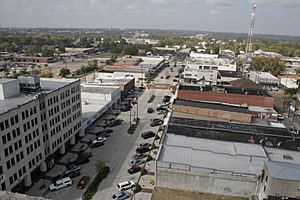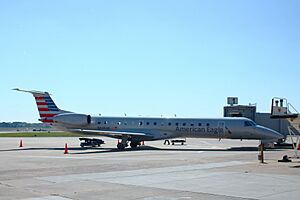Longview metropolitan area, Texas facts for kids
Quick facts for kids
Longview metropolitan area
Longview, Texas Metropolitan Area
|
|
|---|---|

|
|
| Country | |
| State | |
| Principal city | Longview |
| Other city | Marshall |
| Population
(2010)
|
|
| • Total | 280,000 |
| • Estimate
(2019)
|
286,657 |
| • Rank | (ALT: 3rd) |
| Time zone | UTC−6 (CST) |
| • Summer (DST) | UTC−5 (CDT) |
The Longview metropolitan statistical area is a large area in Northeast Texas. It includes four counties: Gregg, Harrison, Rusk, and Upshur. A "metropolitan area" means a big city and the smaller towns and counties around it that are closely connected.
In 2019, about 286,657 people lived here. The main city in this area is Longview. Before 2023, this area was part of an even larger region called the Longview–Marshall combined statistical area. Now, Harrison County is fully part of the Longview metropolitan area.
Contents
Counties in the Longview Area
The Longview metropolitan area covers four important counties. These counties work together to form the larger metropolitan region.
Communities in the Longview Area
Many different towns and cities make up the Longview metropolitan area. Here are some of them, grouped by how many people live there.
Cities with Over 50,000 People
- Longview (This is the main city in the area.)
Towns with 10,000 to 25,000 People
Towns with 1,000 to 10,000 People
Small Towns with 500 to 1,000 People
Villages with Fewer than 500 People
- Reklaw (part of it)
- Union Grove
- Warren City
Unincorporated Communities
These are smaller places that are not officially towns or cities.
- Concord
- Diana
- Elderville
- Joinerville
- Judson
- Laird Hill
- Laneville
- Leverett's Chapel
- Liberty City
- Price
- Selman City
- Turnertown
People Living in Longview Area
This section talks about the people who live in the Longview metropolitan area.
Population and Diversity
In 2021, about 287,868 people lived in the Longview metropolitan area. Most people were White (61%), with a good number of African American (16%) and Hispanic or Latino American (17%) residents. About 5% of the people were of mixed races, and 1% were Asian. The average age of people living here was about 38 years old.
Homes and Housing
In 2021, there were about 106,151 homes in the area. On average, about 2.6 people lived in each home. Many homes (71%) were owned by the people living in them. The typical value of a home owned by its residents was around $155,700.
Religious Beliefs
Many different religions are practiced in the Longview metropolitan area. Christianity is the main religion. Many people are Baptists, and there are also many non-denominational Protestants. Other large Christian groups include Methodists, Pentecostals, Jehovah's Witnesses, Mormons, and Catholics.
Education in the Longview Area
The Longview area is home to several colleges and universities. These schools help students learn and grow.
- LeTourneau University
- Kilgore College
- The University of Texas at Tyler's Longview University Center
Getting Around: Transportation
The Longview metropolitan area has different ways for people to travel.
Air Travel
The main airport for the Longview area is the East Texas Regional Airport. This is where people can fly in and out of the region.
Train Travel
You can also travel by train with Amtrak passenger rail service. The Texas Eagle train stops at a station in downtown Longview. This station is quite busy, being the fifth busiest in Texas for Amtrak.
Trains going between Chicago and San Antonio stop every morning and evening. On certain days (Monday, Wednesday, and Friday), trains also connect Longview to Los Angeles. The return train from Los Angeles to Chicago stops on Sunday, Tuesday, and Friday.
From the Longview station, you can also connect to other cities like Nacogdoches, Lufkin, Houston, and Galveston in Texas, and Shreveport, Louisiana by bus. There are also plans for a new high-speed rail system to connect Dallas/Fort Worth to Shreveport.
Freight Trains
Besides passenger trains, Longview is also served by major freight train companies. These include the BNSF Railway and the Union Pacific Railroad, which help move goods across the country.


